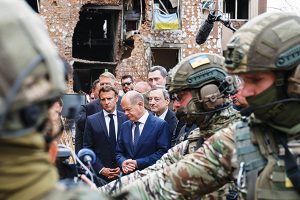Bloomberg
The leaders of Germany, France, Italy and Romania are in Kyiv for talks with President Volodymyr Zelenskiy in by far the highest-profile visit to the country since Russia invaded at the end of February.
They traveled overnight by train to Kyiv and were joined by Romania’s president in a show of solidarity ahead of an expected recommendation Friday from the European Union’s executive that Ukraine be granted candidate status. But discussions may be strained after Kyiv criticized their governments for engaging too closely with Russian President Vladimir Putin and being slow to deliver weapons needed to defeat his invasion.
Kyiv Mayor Vitali Klitschko said the visit by the three EU leaders “is a sign of great support at a time when it is still a risk†to travel to the capital and that it “above all has great symbolic importance.â€
During their visit, Scholz, Draghi, Macron and Iohannis were escorted through the heavily shelled Kyiv suburb of Irpin to get a direct impression of some of the damage caused by Russia’s attack.
Television footage showed the four leaders standing with grim faces in the streets of Irpin — which was under Russian occupation for a month and the site of alleged war crimes — as they were briefed by local officials. They were expected to hold a news conference after the talks with Zelenskiy.
Scholz said in a tweet that the “brutal destruction†in Irpin has “long since become a symbol for the unimaginable cruelty of the Russian war and for senseless violence.â€
Meanwhile, the volume of weapons promised to Ukraine has increased significantly in recent weeks though Germany in particular is lagging behind on actual deliveries, according to the latest data collected by the Kiel Institute for the World Economy.
Poland and the UK have pledged and delivered considerably more than Germany, while Canada and Norway have made slightly smaller pledges but also sent much more, the institute said, citing data through June 7. In absolute terms, the US has already provided weapons worth around 10 times more than Germany, it added.
“This helps to explain the Ukrainian government’s urgent appeals to the German government,†according to Christoph Trebesch, a Kiel Institute research director and head of the team compiling the Ukraine Support Tracker.
Nato defense ministers are meeting in Brussels to discuss support for Ukraine’s defense and strengthening the military alliance’s eastern flank.
Germany is proposing a new model to boost Nato’s defenses on the alliance’s eastern frontier with Russia by identifying units that can be deployed to Lithuania at short notice and link up with allied troops already on the ground, according to people familiar with the issue.
The approach would be an alternative to basing new troops more permanently in the most vulnerable member states.
 The Gulf Time Newspaper One of the finest business newspapers in the UAE brought to you by our professional writers and editors.
The Gulf Time Newspaper One of the finest business newspapers in the UAE brought to you by our professional writers and editors.
